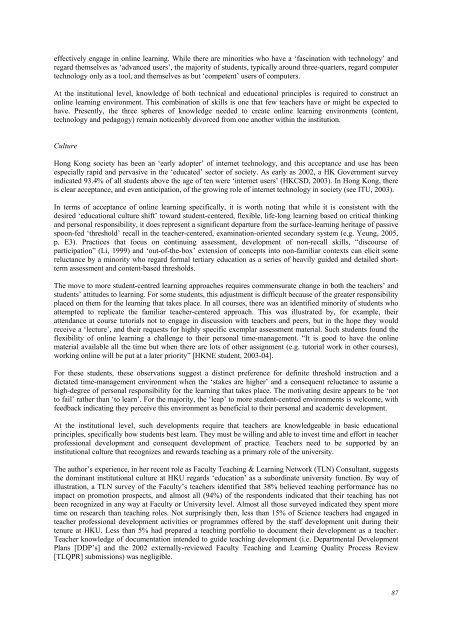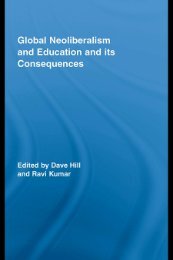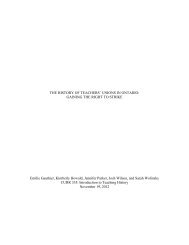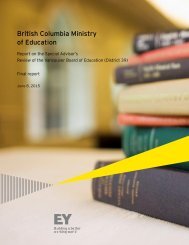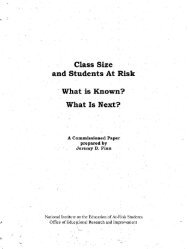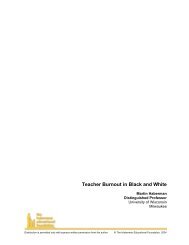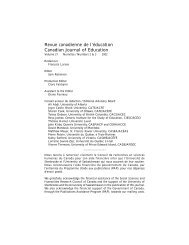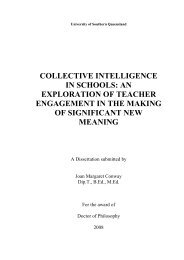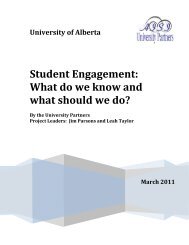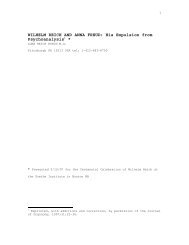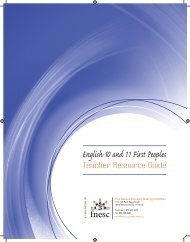October 2006 Volume 9 Number 4
October 2006 Volume 9 Number 4
October 2006 Volume 9 Number 4
You also want an ePaper? Increase the reach of your titles
YUMPU automatically turns print PDFs into web optimized ePapers that Google loves.
effectively engage in online learning. While there are minorities who have a ‘fascination with technology’ and<br />
regard themselves as ‘advanced users’, the majority of students, typically around three-quarters, regard computer<br />
technology only as a tool, and themselves as but ‘competent’ users of computers.<br />
At the institutional level, knowledge of both technical and educational principles is required to construct an<br />
online learning environment. This combination of skills is one that few teachers have or might be expected to<br />
have. Presently, the three spheres of knowledge needed to create online learning environments (content,<br />
technology and pedagogy) remain noticeably divorced from one another within the institution.<br />
Culture<br />
Hong Kong society has been an ‘early adopter’ of internet technology, and this acceptance and use has been<br />
especially rapid and pervasive in the ‘educated’ sector of society. As early as 2002, a HK Government survey<br />
indicated 93.4% of all students above the age of ten were ‘internet users’ (HKCSD, 2003). In Hong Kong, there<br />
is clear acceptance, and even anticipation, of the growing role of internet technology in society (see ITU, 2003).<br />
In terms of acceptance of online learning specifically, it is worth noting that while it is consistent with the<br />
desired ‘educational culture shift’ toward student-centered, flexible, life-long learning based on critical thinking<br />
and personal responsibility, it does represent a significant departure from the surface-learning heritage of passive<br />
spoon-fed ‘threshold’ recall in the teacher-centered, examination-oriented secondary system (e.g. Yeung, 2005,<br />
p. E3). Practices that focus on continuing assessment, development of non-recall skills, “discourse of<br />
participation” (Li, 1999) and ‘out-of-the-box’ extension of concepts into non-familiar contexts can elicit some<br />
reluctance by a minority who regard formal tertiary education as a series of heavily guided and detailed shortterm<br />
assessment and content-based thresholds.<br />
The move to more student-centred learning approaches requires commensurate change in both the teachers’ and<br />
students’ attitudes to learning. For some students, this adjustment is difficult because of the greater responsibility<br />
placed on them for the learning that takes place. In all courses, there was an identified minority of students who<br />
attempted to replicate the familiar teacher-centered approach. This was illustrated by, for example, their<br />
attendance at course tutorials not to engage in discussion with teachers and peers, but in the hope they would<br />
receive a ‘lecture’, and their requests for highly specific exemplar assessment material. Such students found the<br />
flexibility of online learning a challenge to their personal time-management. “It is good to have the online<br />
material available all the time but when there are lots of other assignment (e.g. tutorial work in other courses),<br />
working online will be put at a later priority” [HKNE student, 2003-04].<br />
For these students, these observations suggest a distinct preference for definite threshold instruction and a<br />
dictated time-management environment when the ‘stakes are higher’ and a consequent reluctance to assume a<br />
high-degree of personal responsibility for the learning that takes place. The motivating desire appears to be ‘not<br />
to fail’ rather than ‘to learn’. For the majority, the ‘leap’ to more student-centred environments is welcome, with<br />
feedback indicating they perceive this environment as beneficial to their personal and academic development.<br />
At the institutional level, such developments require that teachers are knowledgeable in basic educational<br />
principles, specifically how students best learn. They must be willing and able to invest time and effort in teacher<br />
professional development and consequent development of practice. Teachers need to be supported by an<br />
institutional culture that recognizes and rewards teaching as a primary role of the university.<br />
The author’s experience, in her recent role as Faculty Teaching & Learning Network (TLN) Consultant, suggests<br />
the dominant institutional culture at HKU regards ‘education’ as a subordinate university function. By way of<br />
illustration, a TLN survey of the Faculty’s teachers identified that 38% believed teaching performance has no<br />
impact on promotion prospects, and almost all (94%) of the respondents indicated that their teaching has not<br />
been recognized in any way at Faculty or University level. Almost all those surveyed indicated they spent more<br />
time on research than teaching roles. Not surprisingly then, less than 15% of Science teachers had engaged in<br />
teacher professional development activities or programmes offered by the staff development unit during their<br />
tenure at HKU. Less than 5% had prepared a teaching portfolio to document their development as a teacher.<br />
Teacher knowledge of documentation intended to guide teaching development (i.e. Departmental Development<br />
Plans [DDP’s] and the 2002 externally-reviewed Faculty Teaching and Learning Quality Process Review<br />
[TLQPR] submissions) was negligible.<br />
87


